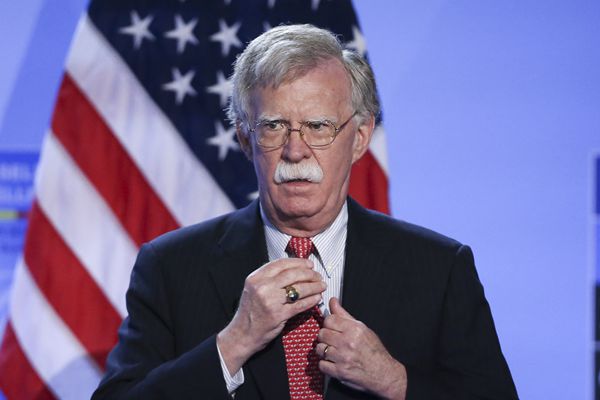Whether he jumped or was pushed, John Bolton fortunately is gone
- By Sajjad Malik
 0 Comment(s)
0 Comment(s) Print
Print E-mail China.org.cn, September 13, 2019
E-mail China.org.cn, September 13, 2019

So far, it's not clear if U.S. National Security Advisor John Bolton was fired or if he resigned. However, that doesn't really make any difference. The fact is: He has vanished from the scene, and that's all for the good.
Bolton's end was unceremonious and ignominious; it took only a pair of tweets by the notoriously tweet-happy boss to do the job.
Trump asserted he had sacked the top aide due to strong differences on some key foreign policy matters. Upset by the "sacking slight," Bolton tried to show that he had already resigned and also shared with media a terse resignation note.
He was the third National Security Advisor to have come and gone during the three years of Donald Trump's presidency. Trump says he will announce a replacement next week, suggesting he already has someone on mind for the top job.
Several names are being mentioned in the media, including Ambassador to Germany, Richard Grenell. The U.S. envoy for Iran, Brian Hook, may also be considered, while Robert Blair, an aide to Mick Mulvaney, the acting White House chief of staff, is also being talked about.
Bolton, appointed in March 2018 was considered as a "hawk of hawks" in American foreign policy circles. Under George Bush, he was among the key architects of the disastrous invasion of Iraq in 2003. Using strong-arm tactics to tame America's enemies has been his favorite foreign policy tool.
He tried to employ the same tactics under Trump, but failed, because though the president likes to fly high on rhetoric, he can often open his arms even to embrace diehard opponents.
Though, Bolton's short stint was not without "success." He can take some pleasure for last year's scrapping of the nuclear agreement with Iran. Apparently, he found himself on the same wavelength with his president, who threw the 2015 deal out of the window.
Another sordid success for which Bolton can claim victory was the undoing of the historic Intermediate-Range Nuclear Force Treaty with Russia. The agreement signed in 1987 kept a lid on a specific category of ground-based missiles for more than three decades.
Trump has currently several major issues in hand, such as Afghanistan, Iran, the DPRK, Venezuela and Syria. Reportedly, Bolton was not happy with the soft handling of some of the problems.
Bolton was an advocate of regime change in Iran. He wanted to teach Iran a further lesson even after the nuclear deal was cancelled. The former NSA was also a big supporter of a first strike against the DPRK to neutralize its perceived nuclear threat.
He pressed the president to actively support the opposition in Venezuela, pushing for a kind of direct intervention, ignoring any consequences of such a rash policy. In case of Afghanistan, he had opposed the Camp David invitation to Taliban by Trump.
The sacking-cum-resignation establishes Trump's authority over security and foreign policy issues. It shows he needs aides who can work according to his vision rather than thrusting their views on him.
In Bolton's case, latterly he had largely failed to catch the ear of the president, who disagreed with many of his suggestions. The former NSA had also stepped on toes of many powerful people around the president.
For example, Bolton and foreign secretary Mike Pompeo were hardly on the talking terms. Their communication was limited to official business. He was also not in the good books of Mick Mulvaney.
Bolton's departure may be a signal for some upcoming changes in foreign policy in the run up to the next presidential elections. The president is now free to formulate his own policy.
The clouds of war hovering over the Middle East may start lifting. Even chances for the first direct meeting between Iranian President Hasan Rouhani and Donald Trump have increased. The two can possibly meet on the sidelines of the U.N. General Assembly later this month, for example.
With Bolton becoming history, Trump can try to revive the summit diplomacy with Kim Jong-un. He can also rethink about reengaging with the Taliban because the two sides have already agreed on a deal to end violence in Afghanistan.
Sajjad Malik is a columnist with China.org.cn. For more information please visit:
http://m.91dzs.com/opinion/SajjadMalik.htm
Opinion articles reflect the views of their authors, not necessarily those of China.org.cn.
If you would like to contribute, please contact us at opinion@china.org.cn.





